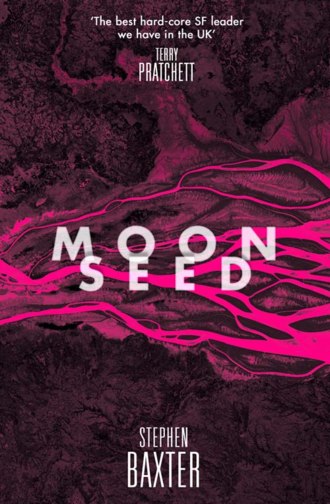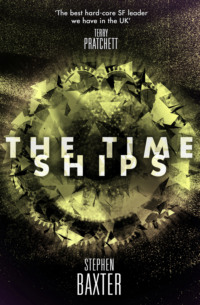
Полная версия
Moonseed
He approached its edge.
It was a pool of some kind of fine silvery dust, or maybe rock flour. He crouched down to see. The contact with the surrounding basalt was quite clean. The rock flour seemed to be stirring slightly, almost bubbling, sluggish currents moving through its substance.
He found a loose pebble. He dropped it into the edge of the puddle. It vanished without so much as a splash.
Jane was standing over him, leaning with her hands propped on her thighs. ‘What do you think it is?’
He scratched his head. ‘I’ve never seen anything like it. Maybe it’s liquefaction. It could be some kind of magmatic event.’
‘Magmatic?’ She straightened up. ‘Come on. Arthur’s Seat has been dormant for three hundred million years.’
‘I know.’
‘It’s probably some kind of toxic waste,’ she said.
‘Maybe.’
He got up and walked off around the rim of the puddle, counting his footsteps.
Jane called, ‘What are you doing?’
‘Measuring.’
‘Why?’
‘It’s an annoying thing geologists do. Can you smell anything?’
‘Apart from bullshit, you mean.’
‘Work with me here.’
She took a deep breath. ‘Nothing but the grass and the haars.’
‘Nor can I.’
‘Is that good?’
‘I don’t know.’
‘Is it bad?’
‘When was the last time you were up here?’
She shrugged. ‘A couple of weeks.’
‘And it wasn’t here then?’
‘No.’
He returned to her. ‘Listen, do you have a bottle? Maybe make-up. Perfume or somesuch.’
‘I don’t wear perfume.’
‘Anything, then.’
As it happened, she did have something. It was a sample of an aromatherapy oil she’d been given by a salesman at the shop. She’d tucked it in a pocket and forgotten about it.
He took the bottle, unstoppered it, and tipped out the oil.
‘Hey.’
‘I’ll pay you.’
He shook the bottle dry, and then, carefully, he scraped the bottle along the top of the rock flour puddle.
When he was done, he stoppered the bottle and tucked it in a pocket of his jeans.
‘What is that stuff?’
‘I don’t know,’ he said. ‘Maybe I’ll be able to find out.’
She looked around. ‘It really is getting dark now.’
‘Yes.’
But he hesitated.
He walked to an outcrop of basalt near the pool, picked up a loose lump of rock, and hit the outcrop. He frowned at the result.
She said, ‘What’s wrong?’
‘Did you hear that?’
‘One rock hitting another? Flintstone chic –’
‘The pitch was low. Basement rock will ring with a high pitch. This boulder is loose.’ So something is breaking up the basement here.
Not good, he thought. Not good at all.
He walked carefully around the puddle. ‘I wouldn’t tread in that thing if I were you.’
‘Why not?’
‘You were saying about dinner …’
‘No. You were saying about dinner.’
They worked their way down the hill, arguing. Henry stumbled occasionally in the deepening dark; each time he patted his jeans pocket to make sure his sample was safe.
Behind them, the puddle glowed softly in the wan Moonlight. Where it stirred, the rock flour rustled.
8
Towards the end of Geena’s eight-hour shift as capcom for Station, a problem came up with a seat liner for one of the Soyuz escape craft.
Because the seats in Soyuz were moulded to fit an individual astronaut or cosmonaut, liners had to be stored for every crew member on Station at any moment. But one of the Russian crew who had just been carried to Station, on board Space Shuttle Endeavour, was complaining that when she tried to install her seat liner into the Soyuz it didn’t fit her. So the ground controllers, in Moscow and Houston, had gotten into a wrangle about what the cosmonaut’s home vehicle was, and Geena found herself on the voice loops to Station trying to explain – in English and Russian – the home vehicle rules.
She read, ‘“The home vehicle for Shuttle-Station crew members is defined as follows. The home vehicle for Americans launched on the Shuttle is the Shuttle. The home vehicle for Americans on Station becomes the Shuttle immediately after the hatches are opened between Station and Shuttle. The home vehicle for cosmonauts launched on the Shuttle becomes the Soyuz, and becomes the Shuttle for cosmonauts on Station after – one – the seat liners are installed for the Station crew in the Soyuz, and – two – the Station crew are briefed on emergency procedures …”’
Traditionally, the Americans tried to use Russian, while the Russians replied in English. It was slow and painfully clumsy, but it did seem as if less mistakes got made that way.
The Russian Interface Officer, a heavy-set woman from New York, was at her side, checking the agreed English-Russian translations of technical terms and acronyms.
The Mission Control Center here at JSC hummed around her, rows of sleek black touch-screen workstations like Star Trek props, littered with coffee cups and yellow stickies and laptops and binders of mission rules. Beside her desk there was a huge recycling bin for soda cans. At the back of the room was a row of pot plants, their tubs littered with more soda cans. At the front of the room, the big screens carried computer-graphic images of the Station’s position and orientation in orbit, a view of the Earth from an external camera, and a shot of a science lab where a European astronaut was freezing saliva scrapings taken from the crew.
It was a familiar working place for Geena, so homely that coming in here was like taking an adrenaline antidote.
Bored to tears, she tried to focus on seat liners.
She’d spent the morning attending a press conference on the plans the boys from JPL were putting up for a fast probe to Venus. It had been exciting, energetic; in fact NASA as a whole had been energized by the Venus event, Geena thought. Whatever the ominous implications, the amount of attention space issues had received since then had been gratifying, and NASA’s speed and flexibility of response invigorating.
But even so, when you got to the coal face of manned spaceflight, it was still a crushing bureaucracy to work in.
The seat liner controversy went on and on.
The hardest thing about managing the Station project was not the technology or the work on orbit. Geena knew from experience that once on orbit, isolated in that collection of tin cans, people tended to drop their personal differences and work together. Integrating two forty-year-old management hierarchies on the ground had proven much more difficult.
Even the basic philosophy of operation of the two control centres differed. For instance, previous Russian space stations – Mir and the Salyuts – had been out of contact with their controllers for most of each day, because of a lack of ground stations around the globe. So the Russians had developed a shift system based on that fact, which differed from the American system. And they’d had to allow their cosmonauts more latitude in day-to-day operations and decision-making than American astronauts, checklisted to death, were generally permitted.
American and Russian mission controllers had worked together for some years now, on the Station assembly project and before that on the Shuttle-Mir docking missions, and had thrashed out a set of common procedures. NASA had given all its astronauts and controllers accelerated Russian language training, and had provided joint training and simulations, and so on.
But it was never going to be easy.
Day to day, they ticked along. But every time a real problem blew up, like this one, it seemed to go to the top of both hierarchies before resolution.
Gradually, the liner problem was eroded to bureaucratic smoothness. And, towards the end of the shift, she was able to snatch a little personal time on the loop with Arkady.
Of course, the whole of the MCC would listen in, as would TsUP, the Russian mission control at Korolyov; in fact a smart IBM computer somewhere would transcribe every word they spoke. But there was still room for a little intimacy. This was one area where the Americans had found they had had a lot to learn from the Russians; those guys seemed to have a better instinct for the internal needs of the people they thrust up there into orbit.
So, thanks to Russian mission rules, Geena and Arkady were allowed their air time.
She read him a poem Arkady’s mother said he had always liked, called Poltav Battle. And then they sang together, her own toneless grunts along with Arkady’s voice – more musical, but reduced to a scratch by the loop – an old Russian song called On the Porch Together. She got the odd stare from her fellow controllers, but she couldn’t care less about that.
When she was done, she had a warm feeling which persisted even after her shift broke up.
She left the MCC, and made her way out of Building 30. She’d been intending to go straight to her car and home.
But she hesitated.
It was late afternoon. Spring: the least offensive period in Houston’s calendar. There was blossom on the trees, and there were, she saw, birds nesting in the big air-conditioning grilles on the side of the faceless concrete block that was Building 30.
She walked to the central quadrangle of the campus, concrete paths criss-crossing the bristly grass between the buildings. No doubt, she thought, there would now be trails of ducklings quacking their way across the campus, if the ducks hadn’t been chased out of JSC twenty years ago for the noise and mess they made. We ain’t here for ducks.
She remembered her promise to figure out the context for Henry’s precious Moon rock. She hesitated. Maybe the spring air was making her mellow.
She walked over to Building 2, Public Affairs, to find out how she could get hold of Jays Malone. It turned out he was coming in the next day, for a lecture and a tour of the lunar colony studies going on here at JSC. She talked her way into an invitation to join the party.
The next day, Geena made her way to the back of a lecture room in the PAO building, while Jays Malone fielded questions about his work from the scattered handful of journalists.
Jays Malone turned out to be a big man, still muscular, slim and supple for his age, which was – Geena knew from the biographies – about 70. He was crisply tanned, right to the crown of his head, which was totally free of hair, polished to a billiard-ball shine. He looked a little dwarfed by the giant show cards his fiction publisher had sent over – Rocky Worlds – A Vision of the Future by a Man Who’s Been There …
Geena had never met Jays before. He had retired before she had even joined NASA. She’d seen him on Apollo retrospectives and the like, but he was a few generations too remote from her astronaut class to have made any difference to her career here.
Jays stood up to speak. He propped his leg up on a chair, leaned on his knee, held a mike with one hand, and when he spoke, his free hand fluttered around his head like a bird, as if out of conscious control.
So, Colonel Malone, why ‘Jays’?
‘It was my sister. When she was a kid she couldn’t say “James” right. It came out “Jays”. It stuck as a nickname.’
Is it true you changed your name by deed poll to Jays?
‘No. And it’s not true I trademarked it, either …’
Laughter. The journos were friendly enough, Geena realized, rows of faces turned to Jays like miniature moons.
Why the title?
‘Something that occurred to me on the Moon,’ he said. ‘Maybe Earth is unique. But the Moon isn’t, even in our Solar System. The Galaxy has got to be full of small, rocky, airless worlds like the Moon, Mercury. Right? I was only a quarter million miles from Earth, but if I looked away from Tom and the LM, away from the Earth, if I shielded my eyes so I could see some stars, I could have been anywhere in the Galaxy – hell, anywhere in the universe …’
The audience shifted, subtly, showing he had hit the wonder nerve. With the younger ones anyhow.
But Geena knew he was cheating a little. There could have been no time for such reflection during those busy three days on the Moon; such insights had come from polishing those memories in his head, over thirty years, like jewels, until he probably couldn’t tell any more what was raw observation on the Moon, or the maundering of an old man.
Your books are full of geology. But you weren’t trained in geology for your Apollo flight …
‘That’s not quite true,’ Jays said, and he expanded.
The Apollo guys had some training from geologists attached to the project – they’d be taken to Meteor Crater, Arizona, or some such place, and taught to look – they had to try to be geologists, at least by proxy, in a wilderness no true scientist had ever trodden before them. But in the end Jays had spent three days bouncing across the Moon, wisecracking and whistling and cussing; for the point of the journey was not the science of the Moon, of course, nor even the political stuff that pushed them so far, but simply to get through the flight with a completed checklist and without a screw-up, so you were in line for another.
But for Jays, there never had been another. After returning home he was caught up in the PR hoopla, stuff he’d evidently hated, stuff that led him to drink a lot more than he should. And by the time he’d come out of that he found himself without a wife and out of NASA, and too old to go back to the Air Force.
Jays talked about all this now. ‘It was a time,’ he said with a smile, ‘I still think of as my Dark Age.’
The audience was silent.
‘But I kept in touch with the studies of the Moon rocks we brought back. I showed up at lunar and planetary science conferences. And that got me interested in geology. I took a couple of night classes, even made a few field trips, over the years. For a while it was just a way to fill up time between Amex commercials and daytime talk shows. But I soon came to know a lot more about the Earth than I ever did about the Moon.’
And, he said, gradually, the geology stuff had hooked his imagination.
Death Valley, for instance: one of the most famous geological showpieces in America. But if you managed to look beyond the tourist stuff about bauxite miners and mule trains, what you had there was a freshwater lake, teeming with wildlife and flora, that had gotten cut off from the sea. Over twenty thousand years the lake had dwindled and become more and more saline; the trees and bushes died off and the topsoil washed away, exposing the bedrock, and the lake’s inhabitants were forced to adapt to the salt or die …
His first piece of fiction, a short story, was slight, a tale of a human tribe struggling to survive on the edge of such a lake.
Nods, from the sf enthusiasts in the audience. The Drying. It had won a prize.
The story sold for a couple hundred bucks to one of the science fiction magazines, Jays said he suspected for curiosity over his name alone. A novel, painfully tapped into a primitive word processor, followed soon after. He hadn’t read sf since he was a kid, but now he rediscovered that sense of time and space as a huge, pitiless landscape that had impelled him towards space in the first place.
Are you arguing for a return to space, in your books?
‘I guess so. I think we need to be out there. You don’t need to know much geology to see that … On Earth, in a few thousand years the ice will be back, scraping the whole damn place down to the bedrock again, and I don’t know how we’re proposing to cope with that. And then there are other hazards, further out …’
The next big rock. The dinosaur killer.
‘It’s on its way, maybe wandering in from the Belt right now, with all our names written on it … Or maybe there is some other hazard, waiting out there to bite us. But I’m not propagandizing here. This is just fiction, right? I want your beer money, not your vote.’
Laughter.
Of course, propagandizing was exactly what Jays was doing.
Jays had said on a multitude of talk shows how he was dismayed by the Shuttle program – a clumsy, compromised, primitive design, just a V-2 with air conditioning, it seemed to him – and by the lack of any serious consideration being given to any more advanced follow-up.
For the fact was there were smarter ways to get into space, to reach the Moon and beyond. For instance, orbits of spacecraft passing between the Earth and the Moon were actually unstable, because of the tweakings of the lumpy gravity fields of Earth, Moon and sun. If you gave your spacecraft the right kind of push, in the right direction, at the right time, you could use that instability to make your spacecraft drift to the Moon. It would take longer to get there than the three days it had taken him, but that wasn’t necessarily a problem, for it would be at a fraction of the cost in fuel and mass in low Earth orbit.
‘Then,’ he said, ‘once you are on the Moon, there’s oxygen, and water, and materials for rocket fuel, and materials to make glass and concrete … Once you are on the Moon, with all those resources out of Earth’s deep, heavy gravity well, hell, you can go anywhere!’
It was a vision he shared with a handful of others, inside and outside NASA: how, with a little imagination, the Solar System could, after all, be opened up for colonization, with the Moon as the key.
Unfortunately, nobody with any power, financial or political, wanted to listen. Even to somebody who had been there.
So he began to work in more subtle ways. He joined the board of the National Space Society, for instance. He published his conceptual studies wherever he could, and plugged them on chat shows. He started to work his ideas into his fictions, building up a body of work that, piece by piece, it seemed to Geena, amounted to a kind of schematic of the future, a ladder to history.
Robert Heinlein had done something similar, back in the ’40s and ’50s, and so nurtured the minds of the youngsters who would go on to run NASA, and touch the Moon. Now – in less optimistic times, with a deeper understanding of how God-awful difficult the whole enterprise would be – Jays Malone was trying the same trick.
‘I tell you,’ he said, ‘I’ve given up on you guys. Your generation. All this New Age crap. But there are always the kids. Always the kids.’
Jays talked on, taking the questions – dumb, perceptive, intrusive, whatever – with a clumsy, good-humoured grace.
She waited until the autograph queue had dissipated, and approached Jays.
Jays regarded her gravely. ‘I know you. Geena Bourne. You just came down from Station.’
‘Yes.’ She felt vaguely surprised that he should follow the current program so closely. ‘I’m glad to meet you.’
‘You are?’
‘I’d like your help. I need to talk to you about 86047.’
A frown crossed his face.
Geena told Jays what she wanted. She hoped that if they went through the moment at which he collected rock 86047 one more time – with the help of the mission transcript and such documentation as existed – they would be able to reconstruct the rock’s context sufficiently to help Henry.
Jays was resistant. ‘I’ve been over those damn three days a hundred, a thousand times. What more is there to say?’
‘Henry thinks there’s plenty you could tell him.’
‘Oh, he does. It was my piece of bedrock, you know.’
‘86047.’
‘Yeah. I guess I risked my life to collect it. And they let it sit in the vault for a quarter-century.’
‘Not any more.’ She outlined Henry’s project. ‘That’s why the context is so important –’
Jays glared. ‘How the hell was I supposed to document it?’
‘Well, that’s the point, Jays –’
‘I had to hang upside down in that damn rille to capture it in the first place. Those geology back-room guys weren’t there. They couldn’t see how hard it was to follow their precious procedures, if you were there. I told them that.’
And so on. A one-way conversation.
‘Anyhow,’ he said to Geena, ‘there’s no good reason to ignore a rock like that for so long. I mean the attention they all gave that Genesis rock from Apollo 15 –’
Ah, Geena thought. That was it. Rivalry with the other crews, the trophy fish they brought home. Even after all this time.
‘But now,’ she persisted, ‘late in the day or not, Henry is going to study it. But he needs your help. I need your help.’
He regarded her, his eyes pale blue.
Jays let her drive him out to his home.
She drove along NASA Road One east through the Clear Lake area – marinas, apartment complexes, parks. When the road reached the coast and turned up to go north towards the Port of Houston, they came to Seabrook. This was an old run-down village, with wooden houses mounted on five-feet stilts.
Jays’s house must once have been handsome, but now it was faded by sun and busted down by the weather and neglect. Some of the houses in the area were being restored now, but not Jays’s. It looked, in fact, like a prop from Gone With The Wind.
It was kind of a nice area, Geena supposed, to retire. The houses would catch the light off of the ocean in the mornings. But it reeked of age.
The house was full of age too. A ticking clock. A dog, a quiet spaniel. A litter of aviation trophies, slowly gathering dust. A bookshelf with a row of his science fiction books, skinny hardback volumes. In the middle of it all, on a walnut coffee table, there was a double picture frame: Jays as a kid, gappy grin and slicked-back hair; and an image of Jays the man in his brief prime, bouncing over the tan brown lunar surface, suit glowing in the sun, on his way to one checklisted task or another.
It was the home of an old man who had been alone too long.
Jays made her a cup of coffee. Full of caffeine and cream, it was all but undrinkable, but she drank it anyway. For himself, he cracked a beer.
‘So,’ he said. ‘You’re trying to help out your ex-husband. Kind of complicated.’ He smiled like a grandfather. ‘Not sure I ought to get involved.’
‘Well, he blames me for canning his project.’
‘The Shoemaker. Is he right?’
‘I don’t think so. I spoke out against it. But you know how this stuff works.’
He nodded and took a pull of his beer. ‘You didn’t do him any damage. But you weren’t too smart about your marriage.’
‘I was speaking up for Man-in-Space.’
‘Sure,’ he said drily. ‘Chewing the balls off of your husband had nothing to do with it.’
‘It wasn’t like that.’
‘And now you want to make it up with him.’
‘No. It’s done. I just don’t want it to finish in bitterness. We’ve got our whole lives ahead.’
He nodded. ‘Smart. A lot of sleepless nights to get through. Sometimes I wish … Well,’ he said, ‘you think we should go back to the Moon?’
‘No. I heard what you said. But we ought to get on with Station. The space lobby is always divided. We should get behind the project we have.’
‘Bull.’ He crumpled the can, seemed to be thinking about another, then decided against it. ‘We’ve been fooling about in Earth orbit for too long. We didn’t need Station to go to the Moon. If we want to go to the Moon then we should go to the Moon. Learn to live off the land. You can’t do that in LEO.’ He eyed her. ‘Not that it would be easy. Some of the space buff types who come to see me seem to think it would be like the pioneer days, setting off into the western desert. It won’t be. We got to the Moon for three days apiece, two guys for just three days, and we had to bend the national economy backwards to do that. Up there, you have to haul along every drop of fuel you need to land, and the dust eats away at any equipment you have, and the volatiles in your seals boil away in the vacuum, and you have to bake the air you breathe out of the rock. Not impossible, but not easy.








